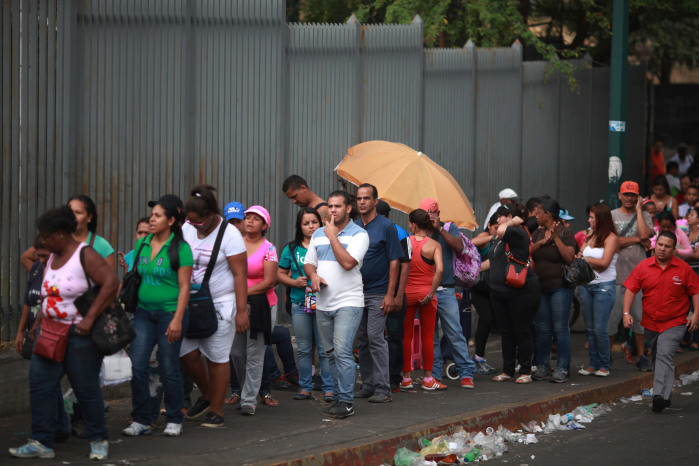CARACAS, Venezuela – Tío Conejo, or “Uncle Rabbit,” is among the most celebrated characters in Venezuelan folklore. Perpetually under threat from his nemesis, the powerful “Uncle Tiger,” the hero manages — through guile, charm and no small amount of luck — to consistently seize the upper hand from his mighty adversary.
These days, Venezuelans must increasingly channel their own inner Uncle Rabbits in order to survive. The country is suffering from unprecedented and appalling shortages of basic goods (including rice, flour, sugar, toilet paper, cooking oil, milk and chicken), stemming from the distortionary effects of an increasingly unmanageable currency control policy and heavy-handed government price controls. Yet while much ink has been spilled discussing the causes of the shortages in Venezuela, little attention has been paid to the desperate strategies ordinary Venezuelans rely on to get by.
When my wife and I returned to Venezuela earlier this month, our trip began with a five-hour odyssey from Maiquetía National Airport to our destination in the Caracas suburb of El Hatillo — a journey of just over 20 miles. The nightmarish traffic congestion was the result of multiple road closures caused by opposition protests and guarimba barricades. While mired in traffic, I suggested to our driver that we might just as well put the time to good use by paying a visit to a grocery store. Stopping at a supermarket in a middle-class neighborhood, our driver asked that we let him know immediately should we come across any milk, coffee or baby food. The driver explained that his brother had recently become the father of twin girls, and that the entire family had been alerted to keep an eye out for provisions for the little ones. (The coffee, of course, would be for the family’s adults, although in a part of the world where coffee represents a crucial part of the social fabric, and the cornerstone of in-house hospitality, this did little to lessen its importance.)
As it happened, milk and coffee were nowhere to be seen. But there was at least some consolation for our driver: a small cache of baby food (all of it Gerber and all plum-flavored). The lines at the cash registers were immense, snaking back into the interior of the store. Nonetheless, my wife, the driver, and I made a point of joining separate lines — a seeming inefficiency that garnered the driver’s hungry nieces a total of 18 small jars of plum puree, three times the rationing limit of six units.
For certain scarce goods like baby food, the Venezuelan government has set strict limits on the amounts that can be procured by an individual at a given time. As a result, Venezuelans are incentivized (as we were) to go shopping in groups but to check out as individuals. The resultant logjam from the flood of additional patrons at checkout — having their credit cards verified, or counting out currency — is further exacerbated by any solo shoppers attempting to charm, threaten or beg cashiers into making exceptions. Sick grandmothers and children abound, as do those who claim to be related to well-known government figures or members of the feared pro-government paramilitary “colectivos.” Some folks even sweet-talk (or bribe) cashiers into storing their confiscated excess goods under the checkout lane temporarily, while the person goes through the line once more: a workaround that can easily turn a grocery shopping trip into an all-day affair.

The government recently announced that it will be rolling out a controversial new Consumer ID system that should assuage the inconvenience somewhat. Publicly the response from the regime and its supporters to growing complaints about these lines has ranged from the dismissive (“People gladly wait in lines at the bank, concerts, and the cinema; why then do they complain about lines to feed themselves?”) to the downright Panglossian (“It means the people [finally] have money to buy things!”).
And yet the sluggish super-lines that result can become dangerous to the storeowners themselves. Alejandro Pasos, who himself runs a confectionary store in the pro-government district of Carapita, told me about one recent episode at a Caracas supermarket. People had been queued up for so many hours at checkout that they were very hungry. Some began taking food from the shelves near the line and just eating it, bananas, crackers, chocolate and so on, dropping the wrappers when they were done. “The store did nothing,” he said, “probably because they didn’t want a riot or to draw the government’s attention. There have been some sackings lately.”
Recommended: Venezuela’s credit rating cut for 3rd time in 3 months
Frustrated customers are likewise resorting to some clever strategies. Let’s say a lone shopper stumbles across a rare good such as toilet paper. She may fill up her entire cart, far in excess of the four rolls allowed for individual purchase, then phone or text friends or relatives to come by to aid with the checkout (and in turn then distribute a bit of the bounty among themselves). For those awaiting such reinforcements, however, vigilance is key. Once the shelves have been stripped bare, fellow shoppers may well become confrontational, seeking to beg, barter or even steal their erstwhile windfalls away.
To avoid conflicts, people sometimes stash goods in seldom-used aisles of the supermarket for later purchase or for an incoming friend. When I finally found some coffee (three days, four supermarkets, and two breakfast Red Bulls after landing), it was because I’d actively decided to search the entire store for some, eventually finding the half-dozen packs of ground beans artfully tucked away under a stack of off-brand cat food.
Some of the most interesting shenanigans still occur at checkout time. Juan Paz, a doctor, admits to sometimes flashing an “official looking” I.D. (actually a laminated membership pass to a local sports club) at unwary cashiers, claiming to be a member of Venezuela’s dreaded Consumer Protection Bureau. “They never actually check,” he tells me, “on the chance that I may really be an official. They’re afraid that I might get angry at having my credentials called into question.”

Another trickster is Andrés Díaz (a pseudonym), a U.S.-educated entrepreneur. He is also quite well-off, a fact which enables him to pay inflated black-market prices or else rely on restaurants (often more likely to be stocked) if he needs to. But he also divulges an occasional recourse to what he calls “the nuclear option”: pretending to be a non-Venezuelan.
“If you fake being a foreigner who doesn’t speak Spanish,” says the fair skinned Caraqueño, “you can simply pretend not to comprehend why exactly they won’t let you buy the goods. You just maintain a blank expression, holding out cash in your hand, and doing your best to sound indignant and perplexed in broken, idiot Spanish. These kinds of tourists are so rare these days in Venezuela, they’ll have absolutely no idea what to do with you. Eventually they’ll sell you whatever you want just to be done with the whole uncomfortable situation.” He cautions against using this technique in a place where someone might recognize you: “You will look pretty ridiculous.”
Intrigued, I decided to try this strategy myself later that same day. Sure enough, following a good 10 minutes of pantomime, and a quick call to a manager who had apparently oversold somewhat her own familiarity with English, I eventually walked out the proud owner of six delicious bags of café San Domingo. Back home, after brewing myself a fine cup of coffee, I made a toast to Uncle Rabbit.
Lansberg-Rodriguez is a fellow at the Comparative Constitutions Project and a weekly columnist for the Venezuelan newspaper El Universal. Follow him on Twitter: @Dlansberg
© 2014, Foreign Policy






